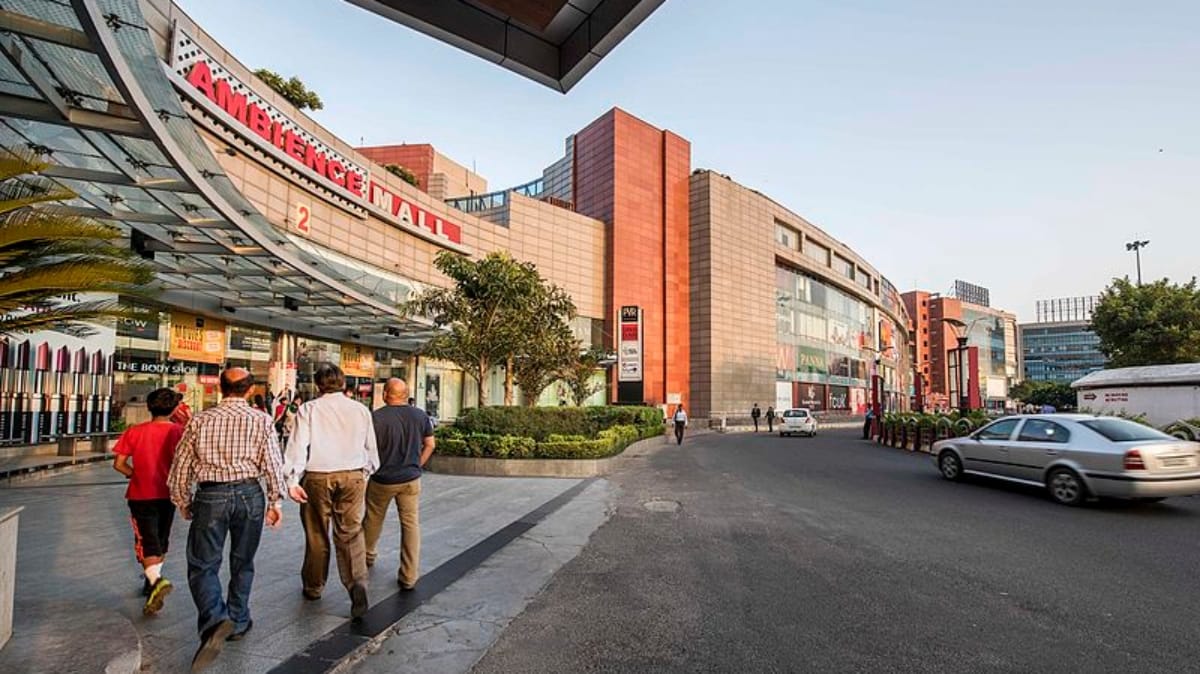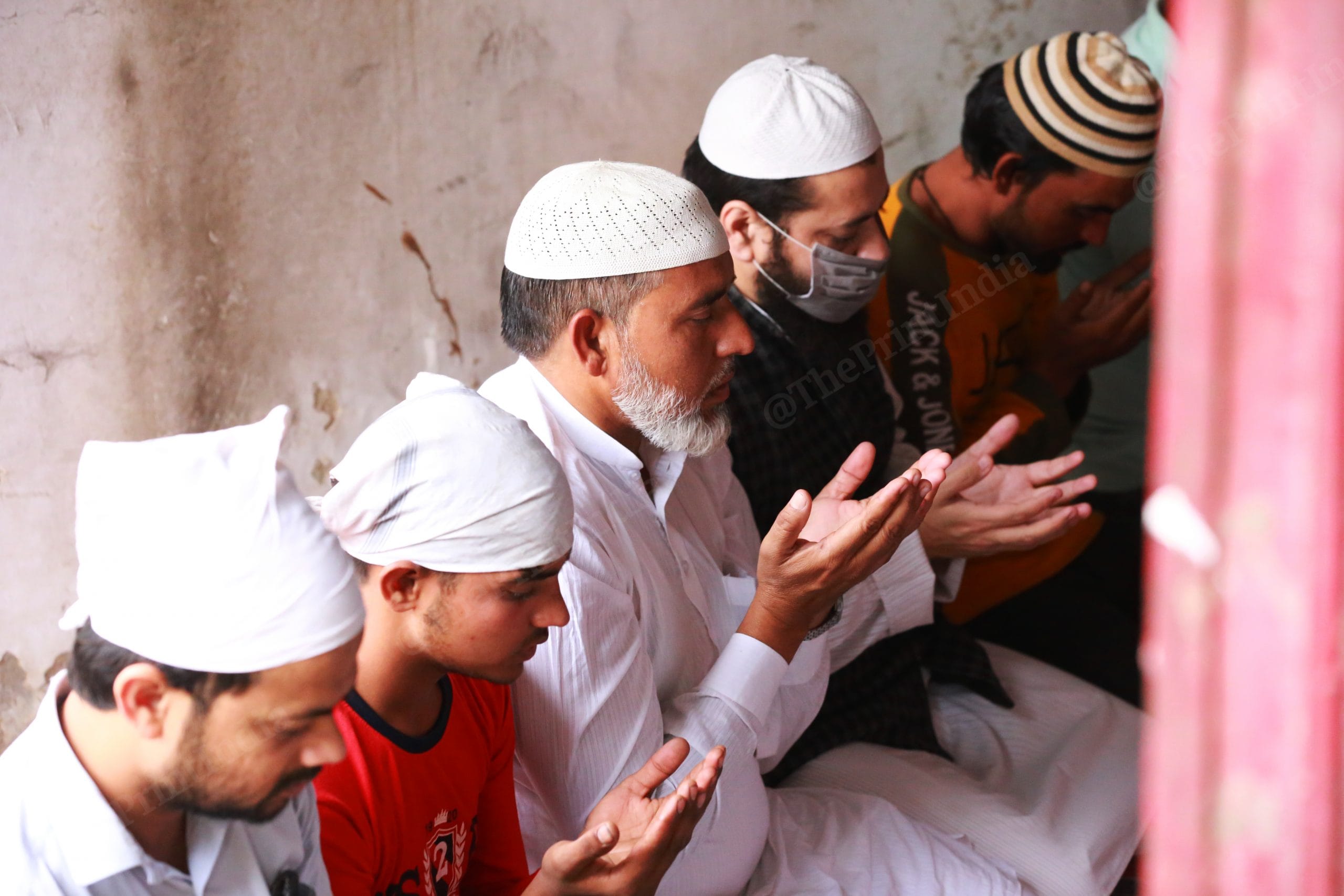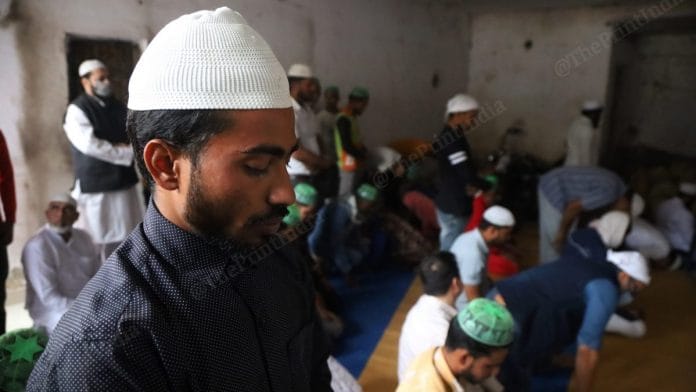With its dizzying high-rise condos and glass fronted offices and malls, Gurgaon was NCR’s Neverland. It offered a glimpse of new modernity, much like Bangalore did in the 1990s, only louder and flashier. But the ‘suburb on steroids’, with neighbourhoods called Beverly Park, Nirvana County and Wellington Estate, now has street groups cheering Nathuram Godse. RSS shakhas grew inside the condominiums, only this time transformed as Sunday 10 am chai baithaks, appropriate for the preppy residents.
Gurgaon’s cosmopolitanism, fuelled by three decades of economic growth, has turned on its head. Over the past few years, the city’s Hindu residents have gathered on streets and parks — to stop fellow Muslim citizens from offering Friday namaz. Now the disruptions have become a weekly affair, with large gatherings occupying spaces where Muslims used to offer namaz, and filling it with cow dung or performing one of their own rituals.
The anti-Muslim hate is widespread, and not just limited to their prayers. “Ubers cancel more often now. Ab pata nahi naam dekh ke ya kuch aur, but pehle se zyada hota hai. It seems like the question has moved from why Muslims need to pray in groups to why they should do anything at all,” says Heena, a 24-year-old design intern, about Uber drivers frequently cancelling ride requests after, she suspects, seeing their names.
Those who have lived in the city for years are acutely aware of the change that has set in, a battleground of sorts to ‘test’ the perseverance of the Muslim community. “What has happened in Gurugram seems like an experiment with how far you can go, and get away with it,” says a pilot who has lived in the city for 17 years, requesting anonymity.
Also read: In Gurugram namaz row, a dozen workers and two shops become collateral damage
Millennium city’s another transformation
Gurgaon’s growth was paved by the entry of global businesses that set up offices here — Ernst & Young, Citibank, American Express, which boasts its highest headcount at its Gurgaon campus than anywhere else in India, and the number of call centres that sprung up as a lifeline for thousands of people hunting for a job.
The city has the most number of startups, after Bengaluru, and from Maruti in the 1980s to Hyundai last year, boasts of having manufacturing plants of various luxury vehicles. Soon, Gurgaon earned the name of a “millennium city”, and started being spoken about as the place to live or set a business in.

“Last 20 years of working in the corporate, we were given spaces to pray, especially during Ramzan. There were iftar parties. Now I think even corporations will say, ‘keep it out of our office’ at least in Gurugram. They are frightened that some Hindu group will come and create an issue,“ says Altaf Ahmed, founding member of Gurgaon Nagrik Ekta Manch (GNEM), a citizens’ forum. The largely ‘apolitical’ corporates are now reacting to the politics unfolding in Gurugram — with silence, refusing to engage and ‘invite’ trouble.
“It is now an almost unwritten code. If you hire Muslims, you may be inviting trouble, because of what keeps happening in Delhi or even in Gurugram,” a senior HR in a leading MNC said on the condition of anonymity,
Muslims were already unable to find houses on rent or purchase one in prime locations because of their religious identity. Now it has spilled over to jobs as well.
Students in big, private schools and universities are experiencing it too. “Nowadays, Muslims are really afraid to practice their own religion and even walking on streets wearing a topi (skull cap), especially at night,” says a student who wishes to remain anonymous.
Ifham, a 28-year-old architect based in Gurugram who studied in Amity University’s Manesar campus, spoke about a conversation he had with his friends last week. They wondered how “the most normal thing” of them offering namaz twice in their college campus back in the day “would be impossible now”.
Also read: Namaz isn’t an anti-Hindu act. Time for every Indian to defend Islam
Politics, lack of administrative support
On 10 December, Chief Minister Manohar Lal Khattar was unequivocal in his protest against Muslim prayer. “Namaz should not become a show of strength,” he said, adding that offering namaz in public places could not be “tolerated”. This is not the first time that Khattar has spoken in this vein. In 2018, he had said that namaz should be offered at mosques, idgahs or other designated places, not in public.
“It is an obligation to do the afternoon prayer in congregation, while the others can be done on your own. There is a lot of misinformation about it, and it has become a ‘religion problem’, instead of it also being a constitutional right,” says a pilot who has lived in the city for 17 years, requesting anonymity.
But Muslims of Gurugram had anticipated such troubles long ago, and had filed applications in 2016 to purchase two of the five Haryana government sites on sale. A report in The Hindu said the trusts representing the community had even paid Rs 18 lakh for the plot but they never got the approval.
“There are only 13 mosques in the city, and several people don’t find space to perform namaz,” said Mufti Saleem Qasmi, a Gurugram-based religious leader.

The ‘public spaces’ where Muslims offer namaz are random lands in front of shops, or dumping grounds where they work as cleaners. These aren’t public parks or ‘prime locations’ that Hindus allege are being ‘hijacked’ by praying Muslim groups.
And so, they have pulled every trick in their book to stop the Friday prayers — from parking trucks to playing cricket to conducting a puja and leaving dung cakes behind. Rarely does the police stop the disruptors.
“All these disturbances used to happen earlier too, when elections were around the corner. Every party has done it to some extent. But now it is all the time, and more mainstream,“ says a corporate leader who has lived in Gurugram for 10 years and helped establish four major corporations.
Altaf Ahmed says “it is the social manifestation of an economic problem”. The Centre for Monitoring Indian Economy (CMIE)’s March 2021 report showed Haryana had the highest unemployment rate in India — 26.4 per cent against the national average of 6.9 per cent. Others may not agree.
Amit, a former wrestler, who claims to be part of the Bajrang Dal and Youth Morcha president of an outfit called Rashtriya Hindu Shakti Sangathan, says that he is unemployed and works for “Hindu rashtra now”.
The police do not have much to comment, except that they are “doing their duty”. There is also confusion among residents as the administration keeps changing the number of ‘allowed’ spaces to offer namaz, depending on how ‘rowdy’ the protesters are. The irony here is that it is done to “maintain peace”.
Also read: Indian Muslims have come to terms with Hindutva. They are now looking for survival strategies
Hate and the silence over it
Gurugram was built by new money, new aspirations and new investments. It is not ‘Dilli meri jaan’ — but an upscale city that prides itself on having the best that money has to offer. Now that idea is shrinking for its middle class Muslims.
“I came back to India after living in the US for 12 years. I wanted my children to experience the Indian culture. I said hello to my neighbour, and he did not even acknowledge. I do not know what to say anymore now,” says 70-year-old Suhel Farooq Khan, who built a house in Palam village when it barely had 200 houses. Now there are more than 5,000 constructions.
Hindus who acknowledge the rise in anti-Muslim hate say they are “afraid” to speak up. “Kafi galat hai yeh sab. Aapas mein hum saalon se reh rahe hain. But kya kar sakte hain, darr lagta hai gundon se. (What’s happening is wrong. Hindus and Muslims here have lived together peacefully for years. But what can we do, we are scared of the goons),” says Rahul Verma, who lives on rent near Sector 12A where BJP member Kapil Mishra had organised the Govardhan Puja to obstruct namaz prayers.
The price of this silence is paid by Muslims. “People have changed their names so that they can continue working,” Altaf Ahmed of Gurgaon Nagrik Ekta Manch says, recounting how WhatsApp forwards about the owner of a dairy shop being a Muslim led to fewer people buying from his shop.
Amir Ullah Khan, Research Director, Centre for Development Policy and Practice, says the current atmosphere came with the change in government. He wants people to “protest” otherwise “everybody will suffer”.
But let alone protest, few even seem willing to speak up.
“What is rattling is the silence of the saner, supposedly peace-loving Hindus. The silence of the so-called secular parties is particularly shameful,” says Amir Abidi, an educationist, whose father was a freedom fighter.
Altaf Ahmed understands the danger. “Look what happened to those who were part of anti-CAA protests in Delhi. Some are still in jail, just for protesting.”
And so, Muslims are devising new ways to deal with the invasion of hate into their jobs, prayer, and even homes.
From surnames to ‘symbols’ that could give away their identity, they are hiding everything. Heena, whose job timings run till late evening, has decided to use her initials now instead of her full name. She can’t afford to have her Uber or Ola rides keep getting cancelled.
(Edited by Prashant)






